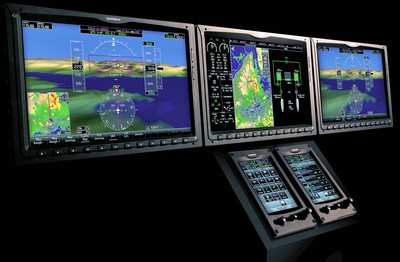Wed, Jul 21, 2010
Garmin Says New Technology Brings A "Sixth Sense" To The
Cockpit
 Garmin says it is developing a new stability augmentation
system called Garmin's Electronic Stability and Protection (Garmin
ESP) system. This electronic monitoring and exceedance-correcting
technology for G1000 and G3000 integrated flight decks works to
assist the pilot in maintaining the aircraft in a safe, flight
stable condition, helping in certain situations to prevent the
onset of stalls and spins, steep spirals or other loss-of-control
conditions should the pilot become distracted, disoriented or
incapacitated during flight.
Garmin says it is developing a new stability augmentation
system called Garmin's Electronic Stability and Protection (Garmin
ESP) system. This electronic monitoring and exceedance-correcting
technology for G1000 and G3000 integrated flight decks works to
assist the pilot in maintaining the aircraft in a safe, flight
stable condition, helping in certain situations to prevent the
onset of stalls and spins, steep spirals or other loss-of-control
conditions should the pilot become distracted, disoriented or
incapacitated during flight.
"Until today, this type of stability augmentation system has
only been available on fly-by-wire aircraft that cost millions of
dollars," Gary Kelley, Garmin's vice president of marketing.
In the announcement made Wednesday, Garmin said the ESP
functions independently of the autopilot, and operates "in the
background" whenever the pilot is hand-flying the aircraft. Garmin
ESP gently nudges the controls back towards stable flight whenever
pitch, roll or high-speed deviations exceed the recommended limits.
Garmin ESP will then disengage when the aircraft returns to its
normal flight.
High and low airspeed protection will also be available with
Garmin ESP while pilots are hand-flying the aircraft. If a
Garmin ESP-equipped aircraft approaches the aircraft's speed limits
(VMO or VNE), Garmin ESP engages and applies force to the control
yoke to increase the aircraft's pitch attitude and prevent a
further increase in airspeed. Garmin ESP also has built in
parameters to prevent the aircraft from exceeding G-limit load
factors upon pullout. In high performance aircraft with angle of
attack/lift sensors, Garmin ESP offers low airspeed or stall
protection that reduces the probability of stalling the aircraft by
providing a gentle pitch-down control force through the control
yoke when the aircraft's wing approaches its critical angle of
attack.

Garmin G3000 Flight Deck
Although Garmin ESP is not an autopilot function, it does
utilize the servos in Garmin's GFC 700 autopilot to provide
stability augmentation. The servos for the GFC 700 provide the
sensing, computation and variable control speed and torque, which
in turn makes it possible for Garmin ESP to provide a gradient
stick force that simulates the natural aerodynamic stability of the
aircraft.
Garmin ESP will be offered as an option on select G1000 and
G3000-equipped aircraft. The implementation and functionality of
Garmin ESP will be determined by individual aircraft manufacturers.
The retrofit G1000-equipped King Air 200 will be the first aircraft
to receive Garmin ESP later this year and it will be available at
an expected list price of $17,995.
More News
Aero Linx: Commercial Aviation Safety Team (CAST) Founded in 1997, the Commercial Aviation Safety Team (USCAST) has developed an integrated, data-driven strategy to reduce the comm>[...]
Land And Hold Short Operations Operations that include simultaneous takeoffs and landings and/or simultaneous landings when a landing aircraft is able and is instructed by the cont>[...]
We're Everywhere... Thanks To You! Even with the vast resources and incredibly far-reaching scope of the Aero-News Network, every now and then a story that should be reported on sl>[...]
Pilot’s Inadvertent Use Of The Landing Gear Control Handle Instead Of The Flaps Selector Switch During The Landing Rollout Analysis: The pilot reported that during the landin>[...]
Also: Cosmonaut Kicked Out, Airbus Scales Back, AF Silver Star, Russian A-60 Clobbered A Samaritan’s Purse humanitarian flight was hijacked on Tuesday, December 2, while atte>[...]
 ANN's Daily Aero-Linx (12.12.25)
ANN's Daily Aero-Linx (12.12.25) ANN's Daily Aero-Term (12.12.25): Land And Hold Short Operations
ANN's Daily Aero-Term (12.12.25): Land And Hold Short Operations ANN FAQ: How Do I Become A News Spy?
ANN FAQ: How Do I Become A News Spy? NTSB Final Report: Cirrus Design Corp SF50
NTSB Final Report: Cirrus Design Corp SF50 Airborne 12.08.25: Samaritans Purse Hijack, FAA Med Relief, China Rocket Fail
Airborne 12.08.25: Samaritans Purse Hijack, FAA Med Relief, China Rocket Fail




